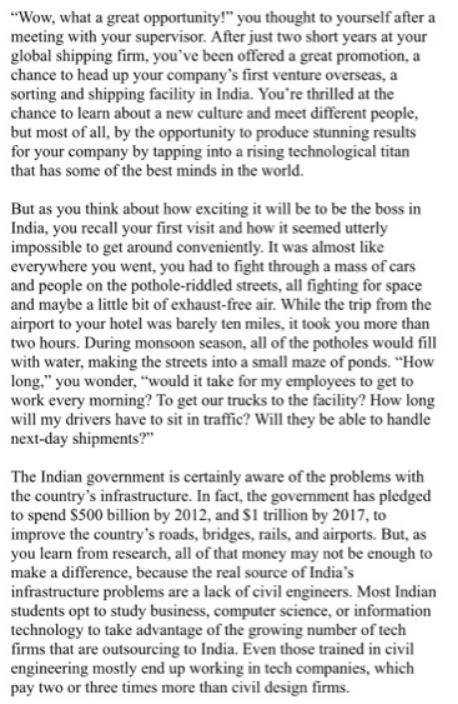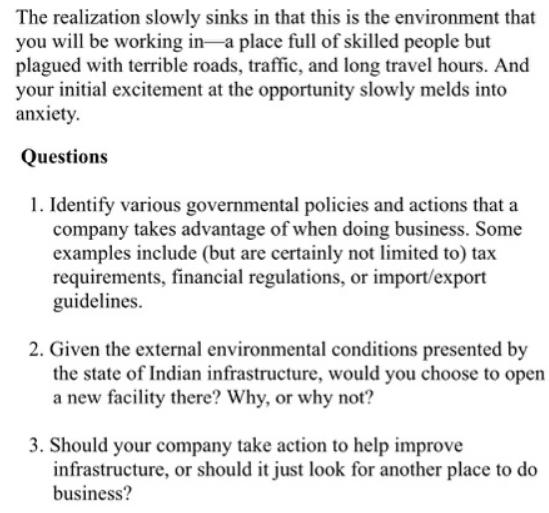Answered step by step
Verified Expert Solution
Question
1 Approved Answer
Wow, what a great opportunity! you thought to yourself after a meeting with your supervisor. After just two short years at your global shipping


"Wow, what a great opportunity!" you thought to yourself after a meeting with your supervisor. After just two short years at your global shipping firm, you've been offered a great promotion, a chance to head up your company's first venture overseas, a sorting and shipping facility in India. You're thrilled at the chance to learn about a new culture and meet different people, but most of all, by the opportunity to produce stunning results for your company by tapping into a rising technological titan that has some of the best minds in the world. But as you think about how exciting it will be to be the boss in India, you recall your first visit and how it seemed utterly impossible to get around conveniently. It was almost like everywhere you went, you had to fight through a mass of cars and people on the pothole-riddled streets, all fighting for space and maybe a little bit of exhaust-free air. While the trip from the airport to your hotel was barely ten miles, it took you more than two hours. During monsoon season, all of the potholes would fill with water, making the streets into a small maze of ponds. "How long," you wonder, "would it take for my employees to get to work every morning? To get our trucks to the facility? How long will my drivers have to sit in traffic? Will they be able to handle next-day shipments?" The Indian government is certainly aware of the problems with the country's infrastructure. In fact, the government has pledged to spend $500 billion by 2012, and $1 trillion by 2017, to improve the country's roads, bridges, rails, and airports. But, as you learn from research, all of that money may not be enough to make a difference, because the real source of India's infrastructure problems are a lack of civil engineers. Most Indian students opt to study business, computer science, or information technology to take advantage of the growing number of tech firms that are outsourcing to India. Even those trained in civil engineering mostly end up working in tech companies, which pay two or three times more than civil design firms. The realization slowly sinks in that this is the environment that you will be working in-a place full of skilled people but plagued with terrible roads, traffic, and long travel hours. And your initial excitement at the opportunity slowly melds into anxiety. Questions 1. Identify various governmental policies and actions that a company takes advantage of when doing business. Some examples include (but are certainly not limited to) tax requirements, financial regulations, or import/export guidelines. 2. Given the external environmental conditions presented by the state of Indian infrastructure, would you choose to open a new facility there? Why, or why not? 3. Should your company take action to help improve infrastructure, or should it just look for another place to do business?
Step by Step Solution
★★★★★
3.30 Rating (147 Votes )
There are 3 Steps involved in it
Step: 1
Answer 1 While doing business in any country the business can take advantage of following policies o...
Get Instant Access to Expert-Tailored Solutions
See step-by-step solutions with expert insights and AI powered tools for academic success
Step: 2

Step: 3

Ace Your Homework with AI
Get the answers you need in no time with our AI-driven, step-by-step assistance
Get Started


